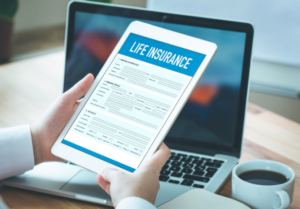 Contrary to popular belief, not everyone needs life insurance. It is important to understand who should buy life insurance, when best to buy it as well as how much you may need. It is also worth knowing when an alternative policy may be more suitable and so in this article, we answer the questions below. You can jump straight to the answers within this article by clicking on the relevant question.
Contrary to popular belief, not everyone needs life insurance. It is important to understand who should buy life insurance, when best to buy it as well as how much you may need. It is also worth knowing when an alternative policy may be more suitable and so in this article, we answer the questions below. You can jump straight to the answers within this article by clicking on the relevant question.
- Do you need life insurance to get a mortgage/buy a house?
- Do you need life insurance if you are single and have no dependents?
- Do you need life insurance if you have children?
- Do you need life insurance after you retire?
- Do you need life insurance to pay for a funeral?
- Do you need critical illness insurance or income protection?
- When do you need to buy life insurance?
- What is the best way to buy life insurance?
Do you need life insurance to get a mortgage/buy a house?
There is no legal requirement to have life insurance in place before you purchase a house. A lender would, however, insist that you purchase buildings insurance, as the policy would guarantee that any damage to the property would be paid for. While it isn't a legal requirement, arranging life insurance when you buy a property is a worthy consideration, especially if you have a partner or children that live in the property with you.
A joint mortgage life insurance policy would ensure that should either partner die, the outstanding balance on the mortgage would be paid off. You may alternatively want to consider a level term insurance policy, which guarantees to pay out a set amount. This could be for a higher amount than what is left on the mortgage and would help with the likely loss of income and additional costs such as funeral expenses if either policyholder were to die. Check out our article 'Mortgage life insurance - what is it and do you need to have it?'.
Do you need life insurance if you are single and have no dependents?
No, if you live on your own and have no dependents then life insurance shouldn't be a top priority. That said, if you have debts or you are worried about how your family would cope with funeral costs, then a small amount of life insurance is sensible. It is worth checking to see if you have any benefits through work, as many employers offer death in service benefits. Some offer three, five or even ten times your annual salary as a death in service benefit, which is ample insurance for most people who live on their own and without any dependents.
You should, however, take a look at other types of protection insurance, such as income protection. Income protection is specifically designed to pay out a portion of your income if you are unable to do your job due to an accident or illness. Income protection insurance helps you maintain your standard of living meaning you can pay towards treatment and cover the bills while not earning a wage. Check out our article 'Income Protection - do you really need it?'.
Do you need life insurance if you have children?
If you have children that depend on you financially then you should have some form of life insurance in place. If you are a single parent, then you need to consider who would be left behind to pick up the pieces and how they would cope financially. Whoever is left to look after your children may have to move to a bigger house or give up work and so having a life insurance policy in place can ensure this is possible.
If you are living with a partner then you should consider insuring both parents on a joint life policy or even better, having a policy each, doubling the cover. Life insurance is relatively inexpensive, starting at around £5 per month and you can tailor the cover to your own specific needs. Remember, just having a small amount of life cover is better than having none and we explain how best to buy life insurance further down this article.
Do you need life insurance after you retire?
It depends. Most people take out life insurance to either cover a large debt such as a mortgage or to provide financial security for their family. If you are retired or coming up to retirement then you should ask yourself whether the people you leave behind are going to be financially impacted. Will you leave a debt? Does someone rely on you financially? If your children are grown up and your mortgage is paid off then there may be little need for life insurance.
If you do not have any savings then you may want to consider a policy that would cover the cost of a funeral, read our article 'Which is the best over 50's life insurance policy?'. There are also specialist life insurance policies that are designed to cover an inheritance tax liability when making gifts. For more information on gifting money, listen to our podcast episode 171.
Do you need life insurance to pay for a funeral?
The average cost of a funeral is somewhere between £3,000 and £5,000 and so if you do not have any savings (or any other form of life insurance) then it would make sense to have a life insurance policy to cover funeral costs. There are specific policies that are designed to cover the cost of a funeral, normally referred to as 'Over 50 life insurance' policies, however, they can be expensive. A level term life insurance policy will be more comprehensive and could even be cheaper, so it is worth checking out our articles 'What are the pros and cons of term life insurance?' and 'Which is the best over 50s life insurance?'
Do you need critical illness insurance or income protection insurance?
Life insurance is a policy that pays out to your intended beneficiaries when you die, whereas critical illness insurance and income protection insurance are policies designed to pay out while you are still living. Critical illness insurance pays out a guaranteed lump sum if you are diagnosed with a specific illness that is listed on the policy and income protection insurance replaces a portion of your income if you are unable to work due to an accident or sickness. In an ideal world, everyone should have both policies.
The reality is that when compared to life insurance, critical illness and income protection insurance are considered expensive. The stats suggest that you are five times more likely to claim on income protection insurance than on a life insurance policy and so naturally, the premiums are going to be a little higher. A sensible solution is to work out how much you can realistically afford to pay and to speak to an independent protection specialist who can work with you to find the best policy for you. We explain more on how to do this below.
When do you need to buy life insurance?
The simple answer to this question is NOW! Life insurance premiums are based primarily on your age and your health and so the longer you wait, the more expensive it becomes. Additionally, the longer you wait, the higher the chance that you will develop an illness or condition that could lead to your life insurance quotes being increased, or even worse, could lead to an application being declined. Cancelling a life insurance policy that you no longer need is far easier than trying to arrange a life insurance policy later in life, especially if you have a complex medical history.
What is the best way to buy life insurance?
Buying life insurance is easier than ever with many online comparison sites allowing you to purchase life cover with the click of a few buttons. Buying life insurance is the easy bit, it is buying the right life insurance for you that is the tricky part. One of the criticisms I have about online comparison sites is that there is relatively little information or advice available. For example, most parents buying life insurance to protect their family would be better off taking two single life policies, rather than one joint life policy. A specialist life insurance adviser* would recommend this because each policy could be written in trust, ensuring any proceeds are paid without the need to pay inheritance tax. It would also mean that the surviving partner would retain their own policy should their partner die and if both parents were to die, then the policy would pay out double the amount of cover.
We have personally vetted the services of a specialist independent broker that can do all of the above and handle all of the paperwork for you. The advisers handle everything, including chasing the insurance company on your behalf. If you are unsure of exactly what you need, why not get in touch with them via this form* and they can help find a policy that suits your budget. Additionally, as a Money to the Masses reader, you'll qualify for up to £50 cashback when you take out a policy.
If a link has an * beside it this means that it is an affiliated link. If you go via the link, Money to the Masses may receive a small fee which helps keep Money to the Masses free to use. This link can be used if you do not wish to help Money to the Masses and do not wish to qualify for the cashback referred to in the article




